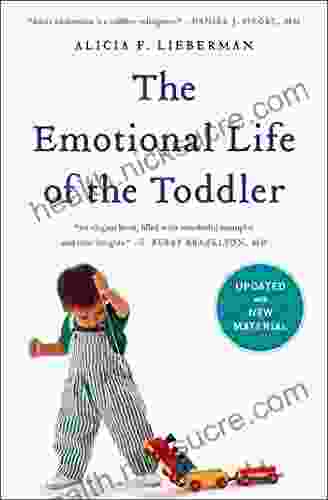The Emotional Life of the Toddler: A Journey into a World of Wonder and Challenges

Toddlers, those curious and energetic beings between the ages of one and three, embark on an extraordinary emotional journey. Their world is a whirlwind of new experiences, rapidly developing cognitive abilities, and social interactions, leading to an array of feelings that can sometimes seem overwhelming. Understanding the emotional life of toddlers is crucial for parents and caregivers to provide the support and guidance they need to navigate this complex landscape.
4.7 out of 5
| Language | : | English |
| File size | : | 15149 KB |
| Text-to-Speech | : | Enabled |
| Enhanced typesetting | : | Enabled |
| Word Wise | : | Enabled |
| Print length | : | 353 pages |
| Screen Reader | : | Supported |
The Spectrum of Toddler Emotions
Toddlers experience a wide range of emotions, from joy and excitement to sadness, anger, and fear. It's important to acknowledge and validate all of these feelings, as they are natural and essential for healthy development.
- Joy: Toddlers delight in the smallest of things, whether it's playing with a new toy or discovering a hidden treasure. Their smiles and laughter are contagious.
- Excitement: Curiosity fuels toddlers' adventures. When they encounter something new and intriguing, their eyes sparkle, and they eagerly explore.
- Sadness: Toddlers can be sensitive to changes in routine, separation from caregivers, or disappointments. These feelings may manifest as tears, whimpers, or withdrawal.
- Anger: Toddlers may express anger through tantrums, hitting, or throwing objects. This is often a response to frustration or a perceived threat.
- Fear: Toddlers can be frightened by loud noises, strangers, or unfamiliar situations. They may cling to caregivers for comfort and security.
Recognizing and Validating Toddler Feelings
Toddlers rely on their caregivers to help them make sense of their emotions. Here are some strategies for recognizing and validating their feelings:
- Observe their body language: Toddlers often communicate their feelings through non-verbal cues, such as facial expressions, gestures, and posture.
- Listen attentively: Even though toddlers may not always have the words to express their feelings, they can still convey them through babbling, gestures, or facial expressions. Listen patiently and try to understand what they are trying to communicate.
- Label their emotions: Help toddlers identify their feelings by labeling them accurately. For example, "I see you're feeling sad because your toy broke." This helps them develop emotional vocabulary and self-awareness.
- Validate their feelings: Let toddlers know that it's okay to feel the way they do. Avoid dismissing or minimizing their emotions. Instead, say things like, "It's okay to be angry when you don't get what you want." This helps them feel understood and accepted.
Strategies for Supporting Toddler Emotional Development
Fostering healthy emotional development in toddlers involves providing a supportive and nurturing environment. Here are some effective strategies:
- Create a secure attachment: Toddlers thrive when they feel secure and loved. This means providing consistent care, responding to their needs promptly, and offering unconditional love and support.
- Establish clear boundaries: Setting clear limits and expectations helps toddlers understand what is acceptable and unacceptable behavior. This provides a sense of structure and security.
- Encourage positive coping mechanisms: Teach toddlers healthy ways to express and manage their emotions, such as talking about their feelings, deep breathing exercises, or engaging in calming activities.
- Role model healthy emotional expression: Toddlers learn from observing the adults around them. Show them how to express and manage your own emotions in a healthy and appropriate way.
- Seek professional help if needed: If a toddler's emotional development is significantly impaired or they are experiencing severe emotional distress, it's important to seek professional help from a child psychologist or therapist.
Understanding the emotional life of toddlers is a journey filled with both joys and challenges. By acknowledging and validating their feelings, providing a supportive environment, and implementing effective strategies, we can help them develop healthy emotional skills that will serve them well throughout their lives. Remember, every toddler is unique, and their emotional development progresses at their own pace. With patience, love, and guidance, we can support their emotional growth and empower them to navigate the complexities of their ever-changing world.
4.7 out of 5
| Language | : | English |
| File size | : | 15149 KB |
| Text-to-Speech | : | Enabled |
| Enhanced typesetting | : | Enabled |
| Word Wise | : | Enabled |
| Print length | : | 353 pages |
| Screen Reader | : | Supported |
Do you want to contribute by writing guest posts on this blog?
Please contact us and send us a resume of previous articles that you have written.
 Fiction
Fiction Non Fiction
Non Fiction Romance
Romance Mystery
Mystery Thriller
Thriller SciFi
SciFi Fantasy
Fantasy Horror
Horror Biography
Biography Selfhelp
Selfhelp Business
Business History
History Classics
Classics Poetry
Poetry Childrens
Childrens Young Adult
Young Adult Educational
Educational Cooking
Cooking Travel
Travel Lifestyle
Lifestyle Spirituality
Spirituality Health
Health Fitness
Fitness Technology
Technology Science
Science Arts
Arts Crafts
Crafts DIY
DIY Gardening
Gardening Petcare
Petcare Lydia Sherrer
Lydia Sherrer Allen J Christenson
Allen J Christenson Rodney Ford
Rodney Ford Todd Wilbur
Todd Wilbur Bruce Tremper
Bruce Tremper Lynn Rush
Lynn Rush Neely Spence Gracey
Neely Spence Gracey Scott Graham
Scott Graham William W Dressler
William W Dressler Godfrey Higgins
Godfrey Higgins Anil Seth
Anil Seth Laura Randall
Laura Randall Suzanne Nottingham
Suzanne Nottingham Lexie Scott
Lexie Scott Charles Conn
Charles Conn Giuseppe Mascoli
Giuseppe Mascoli James Fallows
James Fallows Ann C Logue
Ann C Logue Liz Clark
Liz Clark Casi Mclean
Casi Mclean Maria Rickert Hong
Maria Rickert Hong P Schreiber
P Schreiber Eickhel Mendoza
Eickhel Mendoza Ron Merly
Ron Merly Noor Ain
Noor Ain Jim Mancuso
Jim Mancuso Don Harris
Don Harris Grace Lindsay
Grace Lindsay W Edwards Deming
W Edwards Deming Allan House
Allan House Paul Schullery
Paul Schullery Edwin Amenta
Edwin Amenta Ryan Hall
Ryan Hall Alison Lighthall Miller
Alison Lighthall Miller George Buehler
George Buehler Allen Carr
Allen Carr Maurice Isserman
Maurice Isserman Susan Ware
Susan Ware Theodore B Sauselein
Theodore B Sauselein Kate Mcmahon
Kate Mcmahon Julie Schwietert
Julie Schwietert Alexandra Amor
Alexandra Amor Alicia Jasinska
Alicia Jasinska Dr Danielle Ward
Dr Danielle Ward Brian Treanor
Brian Treanor Kimberly Brown
Kimberly Brown Milt Rosko
Milt Rosko Ed Robinson
Ed Robinson Frank Delaney
Frank Delaney Kenneth Igiri
Kenneth Igiri Bryan Goodwin
Bryan Goodwin Nevin Martell
Nevin Martell Mark Beauregard
Mark Beauregard Daniel Stewart
Daniel Stewart Mourad Boufadene
Mourad Boufadene Kim Liggett
Kim Liggett Ronald Hutton
Ronald Hutton Jennifer Louden
Jennifer Louden Kelsey Banfield
Kelsey Banfield Allen N Mendler
Allen N Mendler Robert Kiltz
Robert Kiltz Chris Cannon
Chris Cannon Naomi Kokoricha
Naomi Kokoricha Allen Everett
Allen Everett Grant S Lipman
Grant S Lipman Wendelin Van Draanen
Wendelin Van Draanen Nick Karas
Nick Karas Joe Vasicek
Joe Vasicek Andrew Kastor
Andrew Kastor Jay Blahnik
Jay Blahnik Jeff Burlingame
Jeff Burlingame Paul Green
Paul Green Eddie Guerrero
Eddie Guerrero Ethem Mining
Ethem Mining Barbara De Angelis
Barbara De Angelis Rex Allen Jones Ii
Rex Allen Jones Ii Katy Milkman
Katy Milkman Ian Westermann
Ian Westermann Allison Dolan
Allison Dolan Philip Gosse
Philip Gosse Jeff Brent
Jeff Brent Beth Cavenaugh
Beth Cavenaugh Robert Green
Robert Green Paul S Auerbach
Paul S Auerbach Susan Kuklin
Susan Kuklin Michele Stanten
Michele Stanten Matthew Syed
Matthew Syed Matt Hart
Matt Hart Allison Alexy
Allison Alexy Allan Trevor
Allan Trevor Douglas Nicholas
Douglas Nicholas Dennis Jarecke
Dennis Jarecke Lisa Marshall
Lisa Marshall Andrie De Vries
Andrie De Vries Joanna Foley Rd
Joanna Foley Rd Jason Padgett
Jason Padgett Brenda Gable
Brenda Gable Matthieu Auzanneau
Matthieu Auzanneau Kevin Leman
Kevin Leman Rebecca St James
Rebecca St James Perry Lefko
Perry Lefko Mary Bergin
Mary Bergin Eric Newby
Eric Newby Grace E Stewart
Grace E Stewart Dr Fiona Mcpherson
Dr Fiona Mcpherson Chris Lundgren
Chris Lundgren Allen O Bannon
Allen O Bannon Eugen Herrigel
Eugen Herrigel Alina A Von Davier
Alina A Von Davier Allen Dulles
Allen Dulles Bill Varney Jr
Bill Varney Jr Rhonda Huettenmueller
Rhonda Huettenmueller Marie Osmond
Marie Osmond Gary Leland
Gary Leland Amy Saltzman
Amy Saltzman Robert S Witte
Robert S Witte Steven J Burton
Steven J Burton Selene Yeager
Selene Yeager Priya Ardis
Priya Ardis Marlin M Mackenzie
Marlin M Mackenzie Leonard Shlain
Leonard Shlain Stephen E Flowers
Stephen E Flowers Tim Roughgarden
Tim Roughgarden Ronald E Mickens
Ronald E Mickens Vincent Schilling
Vincent Schilling John Lloyd
John Lloyd Anna Leinberger
Anna Leinberger Natasha Devon
Natasha Devon Liz Evers
Liz Evers Jacqueline H Wolf
Jacqueline H Wolf Nikki Solano
Nikki Solano Henry Cloud
Henry Cloud Jack Smith
Jack Smith Jeff Hawkins
Jeff Hawkins Sabatino Moscati
Sabatino Moscati Michaelbrent Collings
Michaelbrent Collings Stuart Holmes Coleman
Stuart Holmes Coleman Rex L Forehand
Rex L Forehand Greg Henry
Greg Henry Karen Bonnell
Karen Bonnell Chris Chambers
Chris Chambers Tiger Woods
Tiger Woods Jonathan E Steinhart
Jonathan E Steinhart Randy Olson
Randy Olson Pure Calisthenics
Pure Calisthenics Richard Kaczynski
Richard Kaczynski Arianna Brooks
Arianna Brooks Pamela Douglas
Pamela Douglas Kate Clifford Larson
Kate Clifford Larson Eli Saslow
Eli Saslow Sharon Weinberger
Sharon Weinberger Charlotte Runcie
Charlotte Runcie Kathleen Bachynski
Kathleen Bachynski Sarah P Morris
Sarah P Morris Rob Shelsky
Rob Shelsky Annie F Downs
Annie F Downs Alistair Higham
Alistair Higham Judith Mckay
Judith Mckay Meredith Russo
Meredith Russo Mike Wallace
Mike Wallace Jason Durham
Jason Durham Felix Marks
Felix Marks Frank Christianson
Frank Christianson Suzanne O Sullivan
Suzanne O Sullivan Claude Levi Strauss
Claude Levi Strauss Joel S Owen
Joel S Owen Stuart A Kauffman
Stuart A Kauffman Glenn Tinnin
Glenn Tinnin Dr Nadine Sinclair
Dr Nadine Sinclair James Kipling
James Kipling Stephen R Covey
Stephen R Covey Sheena Byrom
Sheena Byrom Jim Rahtz
Jim Rahtz Courtney Summers
Courtney Summers Ben Greenfield
Ben Greenfield William A Haviland
William A Haviland Neil Hayes
Neil Hayes Carl Paoli
Carl Paoli Allen Morris Jones
Allen Morris Jones Bret Hart
Bret Hart Dr Ron M Horner
Dr Ron M Horner Debi Pearl
Debi Pearl Arthur Aughey
Arthur Aughey Allison Norfolk
Allison Norfolk Marc Bubbs
Marc Bubbs Paul D Brinkman
Paul D Brinkman Maria Thompson Daviess
Maria Thompson Daviess John Shewey
John Shewey Aliza Kelly
Aliza Kelly Molly Forbes
Molly Forbes Carla Mooney
Carla Mooney Laerke Recht
Laerke Recht Sylvia Larsen
Sylvia Larsen Linda S Jones
Linda S Jones D C Fergerson
D C Fergerson Diana Korte
Diana Korte Edmund G R Kraal
Edmund G R Kraal James Patterson
James Patterson Alison Gervais
Alison Gervais Kenji Tokitsu
Kenji Tokitsu Clive Cussler
Clive Cussler Kevin West
Kevin West David Eagleman
David Eagleman Patrick Stewart
Patrick Stewart Rowena Murray
Rowena Murray Phil Hornshaw
Phil Hornshaw Jean Jacques Chevron
Jean Jacques Chevron Lewis Carroll
Lewis Carroll Valerie Gilpeer
Valerie Gilpeer Norrinda Brown Hayat
Norrinda Brown Hayat The School Of Life
The School Of Life Allen Stroud
Allen Stroud Judy Converse
Judy Converse Teri Moser Woo
Teri Moser Woo Judith Rich Harris
Judith Rich Harris Lisa M Rose
Lisa M Rose Danica G Hays
Danica G Hays Aubrey Gordon
Aubrey Gordon Carrot Quinn
Carrot Quinn Emma Shelford
Emma Shelford Signe Pike
Signe Pike Myrna Blyth
Myrna Blyth Jim C Hines
Jim C Hines Brenda Boyd
Brenda Boyd Allison Mcdonald Ace
Allison Mcdonald Ace Allan Hall
Allan Hall Kate Wood
Kate Wood Emily Thiede
Emily Thiede Mary Quinlan Mcgrath
Mary Quinlan Mcgrath Catherine Gildiner
Catherine Gildiner William Stott
William Stott Meritxell Castells
Meritxell Castells Walter Isaacson
Walter Isaacson Pass Your Class
Pass Your Class Sid Roth
Sid Roth Segun Adebajo
Segun Adebajo Harald B Teicher
Harald B Teicher Victor Canning
Victor Canning Daniel J Levitin
Daniel J Levitin Alisha J Brown
Alisha J Brown Vitalis I Valentine
Vitalis I Valentine Robin Stevenson
Robin Stevenson Allison Tyson
Allison Tyson Lynn Acton
Lynn Acton Susan Neiman
Susan Neiman W E Fairbairn
W E Fairbairn John Kavanagh
John Kavanagh The Editors Of Outside Magazine
The Editors Of Outside Magazine Allan Phillips
Allan Phillips Alivia Stephens
Alivia Stephens Karen Murphy
Karen Murphy Toru Toba
Toru Toba Bill Horn
Bill Horn Allistair Mccaw
Allistair Mccaw John Michael Kelly
John Michael Kelly Erica Abbett
Erica Abbett Andrew Benfield
Andrew Benfield Alexander Clarke
Alexander Clarke Edmund Richardson
Edmund Richardson Carlo Ancelotti
Carlo Ancelotti Dan Miller
Dan Miller Somaiya Daud
Somaiya Daud Jim Cheney
Jim Cheney Allen M Hornblum
Allen M Hornblum Amy Wenzel
Amy Wenzel Mark Kistler
Mark Kistler Lynn Stafford Yilmaz
Lynn Stafford Yilmaz Karen Blumenthal
Karen Blumenthal Tom Kelly
Tom Kelly George M Johnson
George M Johnson Simone Milasas
Simone Milasas Jennifer Waldburger
Jennifer Waldburger John Macinnes
John Macinnes C Calvin Jones
C Calvin Jones Jonathan St B T Evans
Jonathan St B T Evans Linda Greenlaw
Linda Greenlaw Alister E Mcgrath
Alister E Mcgrath Mara Krechevsky
Mara Krechevsky N B Hankes
N B Hankes Michael Fullan
Michael Fullan Brian Boone
Brian Boone Anna Costaras
Anna Costaras Cy Tymony
Cy Tymony Kaylee Cole
Kaylee Cole Grant Petersen
Grant Petersen Paul J Kosmin
Paul J Kosmin Jennifer E Smith
Jennifer E Smith Tom Daley
Tom Daley Alison Palmer
Alison Palmer Julie Morgenstern
Julie Morgenstern Sam Jefferson
Sam Jefferson Gregory Cochran
Gregory Cochran Emily Parke Chase
Emily Parke Chase Jen Torborg
Jen Torborg Tom Babin
Tom Babin Carolyn Shearlock
Carolyn Shearlock Elce Junior Lauriston
Elce Junior Lauriston Jimena Canales
Jimena Canales Linda A Curtis
Linda A Curtis William B Helmreich
William B Helmreich Scott Smith
Scott Smith John Bul Dau
John Bul Dau Don Miguel Ruiz
Don Miguel Ruiz Vivian Gornick
Vivian Gornick Mike Zimmerman
Mike Zimmerman Jim Cobb
Jim Cobb Christina Hoff Sommers
Christina Hoff Sommers Douglas Whynott
Douglas Whynott Jeff Gordon
Jeff Gordon John Hughes
John Hughes Robert M Sapolsky
Robert M Sapolsky Maria Hannay
Maria Hannay Richard H Thaler
Richard H Thaler Lsatmax Lsat Prep
Lsatmax Lsat Prep Sportsman S Connection
Sportsman S Connection Fluent In Korean
Fluent In Korean James Sieckmann
James Sieckmann David F Anderson
David F Anderson David Hurst Thomas
David Hurst Thomas Jorge Muniz
Jorge Muniz Jeffrey E Young
Jeffrey E Young Milton Gussow
Milton Gussow Sean Patrick
Sean Patrick Kara Lawrence
Kara Lawrence Meredith L Jacobs
Meredith L Jacobs Joe Sparrow
Joe Sparrow Robbin Gregory
Robbin Gregory Ashley D Kendall
Ashley D Kendall Ken Cohen
Ken Cohen Novak Djokovic
Novak Djokovic Joe Kenn
Joe Kenn Allison Williams
Allison Williams Winston Churchill
Winston Churchill Leah Vanderveldt
Leah Vanderveldt Roy Clark
Roy Clark Jon S Bailey
Jon S Bailey Alan Watts
Alan Watts Rick Johnson
Rick Johnson Allan Kardec
Allan Kardec Gail Steketee
Gail Steketee Itzik Ben Gan
Itzik Ben Gan Jenara Nerenberg
Jenara Nerenberg Chip Coffey
Chip Coffey Gerd Gigerenzer
Gerd Gigerenzer Hilda Jarman Muir
Hilda Jarman Muir David Hancock
David Hancock The Dark Lords
The Dark Lords Konnie Wong
Konnie Wong Alistair Brownlee
Alistair Brownlee Roy Shepard
Roy Shepard Greg Moran
Greg Moran Karen Wambach
Karen Wambach Bright Summaries
Bright Summaries Jared Cohen
Jared Cohen Kwame Onwuachi
Kwame Onwuachi Robert Taylor
Robert Taylor Michael Reist
Michael Reist Gavin Fairbairn
Gavin Fairbairn Eric Naguski
Eric Naguski Sarah Grison
Sarah Grison Kristine Hudson
Kristine Hudson Helen Macdonald
Helen Macdonald Tim Hodkinson
Tim Hodkinson Peter Mark Adams
Peter Mark Adams Amby Burfoot
Amby Burfoot Chris Lear
Chris Lear Muthukumaran Mani
Muthukumaran Mani Joseph Harkreader
Joseph Harkreader Elliot Aronson
Elliot Aronson Dennis Overbye
Dennis Overbye Debra L Martin
Debra L Martin Marti Olsen Laney
Marti Olsen Laney Eric Lemarque
Eric Lemarque Joosr
Joosr James Ferguson
James Ferguson P J Richards
P J Richards Dan Abrahams
Dan Abrahams Dave Pelz
Dave Pelz Shawn D Madden
Shawn D Madden Thomas R Verny
Thomas R Verny Alison Aulakh
Alison Aulakh Michael Shermer
Michael Shermer Christian Asonye
Christian Asonye Carla Simpson
Carla Simpson David M Killoran
David M Killoran J R R Tolkien
J R R Tolkien Alicia F Lieberman
Alicia F Lieberman Trae Dorn
Trae Dorn Joe Kelly
Joe Kelly Lionel Cruzille
Lionel Cruzille Mandi Hickman
Mandi Hickman Marianne Williamson
Marianne Williamson Carlos Castaneda
Carlos Castaneda John C Lennox
John C Lennox Rachel Caine
Rachel Caine Roy Macskimming
Roy Macskimming Stephen Haddelsey
Stephen Haddelsey Olajumoke Adenowo
Olajumoke Adenowo Jonathan Moeller
Jonathan Moeller Janet E Wall
Janet E Wall Jim Bell
Jim Bell Peggy L Chinn
Peggy L Chinn Randy Russell
Randy Russell Iain Gately
Iain Gately Chris Fox
Chris Fox S Allen Counter
S Allen Counter Michelle Nijhuis
Michelle Nijhuis Alistair Cooke
Alistair Cooke Raychelle Cassada Lohmann
Raychelle Cassada Lohmann John Bargh Ph D
John Bargh Ph D Josephine Perry
Josephine Perry Peter Van Der Linden
Peter Van Der Linden Allen G Taylor
Allen G Taylor Tom Watson
Tom Watson J Richard Gott
J Richard Gott 10th Edition Kindle Edition
10th Edition Kindle Edition Etienne Noumen
Etienne Noumen Julie Currin
Julie Currin Bogdan Ivanov
Bogdan Ivanov Peter Hollins
Peter Hollins James F Mckenzie
James F Mckenzie Daniel Mendelsohn
Daniel Mendelsohn Nick Riley
Nick Riley Kota Nozomi
Kota Nozomi Christopher Bruhn
Christopher Bruhn Suzanne Alderson
Suzanne Alderson Roger Bannister
Roger Bannister Mian Majid Ali Afzal
Mian Majid Ali Afzal Robert Penn Warren
Robert Penn Warren Kaitlyn Hill
Kaitlyn Hill Pottermore Publishing
Pottermore Publishing Richard M Van Gaasbeek
Richard M Van Gaasbeek Giancarlo Lemmi
Giancarlo Lemmi Tim Baker
Tim Baker John Novosel Jr
John Novosel Jr Justin J Exner
Justin J Exner Jdmission Senior Consultants
Jdmission Senior Consultants Mark Dice
Mark Dice Apryl Baker
Apryl Baker Kim Heacox
Kim Heacox C S Wilde
C S Wilde Jeremy Evans
Jeremy Evans Saint Teresa Of Avila
Saint Teresa Of Avila Allen R Angel
Allen R Angel Joshua Elliot James
Joshua Elliot James Dan Millman
Dan Millman Deborah Ann Davis
Deborah Ann Davis Travis Jeffery
Travis Jeffery Pasco Valana
Pasco Valana Dennis Georgatos
Dennis Georgatos Rene Almeling
Rene Almeling Bobby Clampett
Bobby Clampett Raymond Turner
Raymond Turner Frederick Courteney Selous
Frederick Courteney Selous Monique Joiner Siedlak
Monique Joiner Siedlak Linda Barrett Osborne
Linda Barrett Osborne Cinda Williams Chima
Cinda Williams Chima Bill Hendricks
Bill Hendricks Despina Meris
Despina Meris Shobi Nolan
Shobi Nolan Daniel J Siegel
Daniel J Siegel Robin Riley
Robin Riley Deborah Macnamara Phd
Deborah Macnamara Phd Petr Zima
Petr Zima Mark F Sohn
Mark F Sohn Allison Schrager
Allison Schrager Geoff Salmon
Geoff Salmon Joseph Fort Newton
Joseph Fort Newton Steve J Martin
Steve J Martin Brian Lopes
Brian Lopes Cate Stillman
Cate Stillman Chris Mulder
Chris Mulder Y R Davis
Y R Davis Allison Arevalo
Allison Arevalo Tami Asars
Tami Asars Tami Overhauser
Tami Overhauser Alicia Thomas Woolf
Alicia Thomas Woolf Alison Pearlman
Alison Pearlman Allan G Bluman
Allan G Bluman Gary Sizer
Gary Sizer Ryan Spaeder
Ryan Spaeder Tress Bowen
Tress Bowen Holly Homer
Holly Homer Charles J Robinson
Charles J Robinson Annabeth Headrick
Annabeth Headrick Tim Rappleye
Tim Rappleye Brett Lee Scott
Brett Lee Scott Marc Vachon
Marc Vachon Lennard Bickel
Lennard Bickel Matthew Mccoy
Matthew Mccoy Mary Elizabeth O Brien
Mary Elizabeth O Brien Frederick Mosteller
Frederick Mosteller Alison Scott Wright
Alison Scott Wright Linda Martella Whitsett
Linda Martella Whitsett L H Nicole
L H Nicole Franz Kellermann
Franz Kellermann Greg Strandberg
Greg Strandberg Joel Thomas Chopp
Joel Thomas Chopp Jim Downs
Jim Downs Aly Raisman
Aly Raisman
Light bulbAdvertise smarter! Our strategic ad space ensures maximum exposure. Reserve your spot today!
 Jay SimmonsFollow ·11.6k
Jay SimmonsFollow ·11.6k Kenneth ParkerFollow ·3.5k
Kenneth ParkerFollow ·3.5k Isaiah PriceFollow ·2.9k
Isaiah PriceFollow ·2.9k Cruz SimmonsFollow ·7.4k
Cruz SimmonsFollow ·7.4k Brent FosterFollow ·16.2k
Brent FosterFollow ·16.2k Desmond FosterFollow ·5.1k
Desmond FosterFollow ·5.1k Dashawn HayesFollow ·10.5k
Dashawn HayesFollow ·10.5k Branden SimmonsFollow ·3.8k
Branden SimmonsFollow ·3.8k

 Dominic Simmons
Dominic SimmonsFierce Attachments: A Memoir by Vivian Gornick - A...
Vivian Gornick's Fierce Attachments is a...

 Edison Mitchell
Edison MitchellPrimer for America's Favorite Wilderness: A Comprehensive...
In the vast...

 Jan Mitchell
Jan MitchellIntroduction to Probability: A Comprehensive Guide for...
Probability is a crucial branch of...

 Chuck Mitchell
Chuck Mitchell100,000 Mile Journey Into the Heart of America
In 2016, I embarked on a...

 Eddie Bell
Eddie BellHow Schools Around the World Are Inspiring Greatness One...
Education is the key...

 Quentin Powell
Quentin PowellJourney into the Heart of Alaska: Exploring the Majestic...
Alaska, the largest...
4.7 out of 5
| Language | : | English |
| File size | : | 15149 KB |
| Text-to-Speech | : | Enabled |
| Enhanced typesetting | : | Enabled |
| Word Wise | : | Enabled |
| Print length | : | 353 pages |
| Screen Reader | : | Supported |












